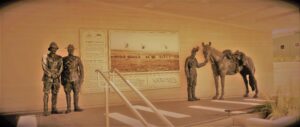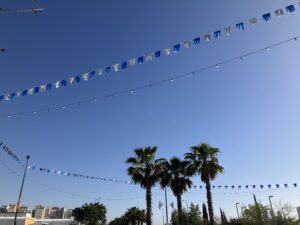The Old Testament teaches that because of the sin that entered the world, there is no longer a direct relationship between human-beings and God, as there was in the beginning. The sin in us separates us from God. The prophet Isaiah described the situation very well: “Behold, the LORD’s hand is not shortened, that it cannot save, or his ear dull, that it cannot hear; but your iniquities have made a separation between you and your God, and your sins have hidden his face from you so that he does not hear.” (Is. 59:1-2)
In the Pentateuch we learn that when God gave the Law, only the high priests were allowed to enter the Holy of Holies, and only after they offered a sacrifice in order to first purify themselves. The priests are the ones who mediated between the people of Israel and God. Generally it is true that every Jew could cry out to God and beg for His mercy. But, without the atoning sacrifice offered by the high priest, no Jew could come directly into the presence of God. Therefore, one of the roles of the Messiah (as foretold by the Old Testament prophets) is also to be a High Priest for us.
The Messiah was not to be a regular priest who offers sacrifices and atonement, but the ultimate High Priest, who is a sacrifice for us in Himself, and our atonement. Because of his sacrifice, our sins are forgiven, and through Him the door to God opens for us. But for obvious reasons there are many modern rabbis in our day who oppose this idea which is rooted so deeply in the Old Testament, and claim that every Jew, wherever he is, has constant and direct access to God.
See for example the words of Rabbi Daniel Asor: “The Prophet Jeremiah writes: ‘And no longer shall each one teach his neighbor and each his brother, saying, ‘Know the LORD,’ for they shall all know me, from the least of them to the greatest, declares the LORD. For I will forgive their iniquity, and I will remember their sin no more.””
The Rabbi quotes one verse from Jeremiah 31:34 and continues to claim: “The verse teaches that because of the direct forgiveness of sins, without any mediation, everyone will know Him directly.” Apparently, no covenant was made here, there is no mediator, everyone suddenly enjoys a direct relationship with God, and all this in complete contrast to all that occurs in the Old Testament; for example, in 2 Chronicles 26, King Uzziah decided to enter the Temple and light incense. He might have had good intentions, but he was struck with leprosy because he entered the Holy Place and did something that only the priests were permitted to do. Even the kings had to go through a mediator; through the High Priest, in order to fellowship with God.
It would be interesting to see what might have happened to Rabbi Asor, if he was to enter the Holy of Holies at the Temple… But let’s get back to Jeremiah 31… Pay attention to how Rabbi Asor took the verse out of its context. Let’s read the verse again, this time we’ll begin with some of the previous verses, from the beginning of God’s address beginning at verse 31:
“Behold, the days are coming, declares the LORD, when I will make a new covenant with the house of Israel and the house of Judah, not like the covenant that I made with their fathers on the day when I took them by the hand to bring them out of the land of Egypt, my covenant that they broke, though I was their husband, declares the LORD. For this is the covenant that I will make with the house of Israel after those days, declares the LORD: I will put my law within them, and I will write it on their hearts. And I will be their God, and they shall be my people. And no longer shall each one teach his neighbor and each his brother, saying, ‘Know the LORD,’ for they shall all know me, from the least of them to the greatest, declares the LORD. For I will forgive their iniquity, and I will remember their sin no more.” (Jer. 31:31-34)
God promised there would be a condition to knowing Him in this direct way; that there would be a new covenant instead of the covenant He made with the people of Israel after the Exodus. Not like the Mosaic covenant which was written on tablets of stone, but a new covenant, which will be written on the heart. Thanks to the sacrificial atonement of the Messiah, our heart was cleansed and purified from our inequities and now God can write His new covenant on our hearts.
In the New Testament, the Apostle Paul in chapter 10 of his letter to the Hebrews, explains it this way: “Since we have confidence to enter the holy places by the blood of Jesus, by the new and living way that he opened for us through the curtain, that is, through his flesh, and since we have a great priest over the house of God, let us draw near with a true heart in full assurance of faith, with our hearts sprinkled clean from an evil conscience and our bodies washed with pure water.” (Heb. 10:19-22) God made a new covenant with us thanks to the Messiah, who cleansed our hearts from sin.
Jesus declared: “I am the way, and the truth, and the life. No one comes to the Father except through me.” (Jn. 14:6) He also said: “I am the door of the sheep.” (Jn. 10:7) The “door of the sheep” is the gate through which the people of Israel brought the sacrifices to the High Priest at the Temple, so he could atone for their sins. The sacrifice of Jesus the Messiah and His resurrection are what opened the door to heaven for us all, Jews and Gentiles alike. Thanks to Him, our sins are forgiven. We have direct access to God Himself. Jesus is the High Priest, He is the mediator, and He is the new covenant.
Did you notice the irony and the hypocrisy in Rabbi Asor’s sayings? After all, while he is opposing the Messiahship of Jesus under the claim that the people of Israel don’t need mediators, he gives himself the title “Rabbi”. After all, the whole concept of ‘rabbis’ is actually people who took upon themselves the place of a mediator between the “Jewish layman” and God. The entire Orthodox community believes that the wise rabbi represents God and connects between them and God. One of the most prominent customs of the Orthodox community is laying prostrate on graves and praying to dead rabbis or to heroes of the past, hoping that through their mediation, God will forgive their sins.
See for example the prayer of Rabbi Chaim Ben-Attar: “Oh Merciful King! I have come today to prostrate myself on the Tomb of Rachel our Matriarch. Let her good acts that she has done throughout her life, stand in my favor, especially her righteousness and heartfelt prayers to You… In her merit, Rachel our Matriarch, please forgive us for all our transgressions and iniquities, and our sins that we have committed.”
By the way, prostrating on graves is idolatry, which is forbidden in the Law.
In Numbers 19, God says to the people of Israel, that whoever touches a grave, his soul will be cut off from Israel. This, to our regret, doesn’t prevent hundreds of thousands of Orthodox and rabbis prostrating themselves on graves of the righteous every year.
To conclude, while in Old Testament times it was the priests who mediated between the people of Israel and God, we now can have a relationship and a direct connection with God through Jesus the Messiah, the High Priest of us all. Jesus opened the door for us to the Holy of Holies and to God’s throne of honor in Heaven. And through His blood and His sacrifice, He enabled us to directly approach the holy presence of God. This is the mediator who we need. Without Him, the door is locked before us. Thanks to Him it is wide open.

ANZAC Day and the Antipodean Heroes of Beersheba
April 25 of each year is ANZAC day, commemorating the brave Australians















